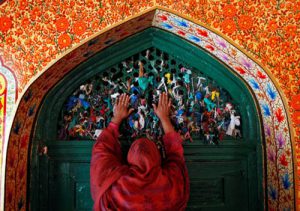Give God your existence and God will give you His Life.
 Today is September 30, Mevlana’s birthday and the 10th day of Muharram, remembered primarily for the martyrdom of Imam Hussein. On this day we are especially grateful for the wisdom that unites us with reality and the example of holiness of our spiritual ancestors.
Today is September 30, Mevlana’s birthday and the 10th day of Muharram, remembered primarily for the martyrdom of Imam Hussein. On this day we are especially grateful for the wisdom that unites us with reality and the example of holiness of our spiritual ancestors.
The words of Abul Hasan Kharakani which form September’s theme are the essence of this path. Virtually every page of Mevlana’s Mathnawi is telling us how it is possible to deepen in this relationship with God. Sometimes the message is very practical, as in this story:
“I am searching everywhere for a human being who is alive
with the life inspired by divine breath.
Does such a being exist?”
“This bazaar,” said the other,
“is crowded with human beings.”
The sage answered, “I want one
who is a human being on the two-eyed road:
in the moment of anger and at the time of desire.
Where is someone who is a human being
both when anger comes and at the moment of appetite?
From street to street, I search for someone like that.
Where in the world is one
who remains human in both these moments?
I would devote my life to such a human being.”
[V, 2890-2894]
“To be alive with the life inspired by divine breath” is more than a metaphor, it is a key to a spiritual practice which can change the very quality of our being. Every breath we breathe with gratitude and awareness awakens the soul and frees us from egoism. Conscious breathing is one method that leads to the development of our very humanness.
Another way of talking about this merging with the divine is the idea of “selflessness,” an easily misunderstood concept. There are, of course, many levels to the realization of selflessness, but to begin at a very practical level: there’s a big difference between the state of being constantly preoccupied with thoughts of our selves, as contrasted with the state of simple awakened presence. In such a state, which we also like to describe as “heartfulness,” we are fully self-aware, empty, receptive, open in a direct experience of life.
Truly anyone who has become selfless
has become everyone’s self:
when he is not loved by himself
he becomes loved by everyone.
A mirror clear of all images
is the most brilliant.
It purely reflects all images.
[V: 2665. . .]
The clear mirror of the human heart is more capable of being in a true relationship with another human being, with one’s environment, and ultimately with the divine. Such a heart reflects what simply is, and may also be open to receiving the subtle intuitions and blessings of a higher reality.
If we don’t understand it one way, Mevlana freely gives it to us in another way. Here he reminds us of the possibilities of selfless service:
Serve God, so by chance you may become a lover:
devoted service is a means toward Love.
The servant desires to be freed from fate,
but God’s lover wishes never to be free again.
Some servants seek benefits and robes of honor;
the lover’s robe of honor is vision of the Beloved.
Not contained by speech or hearing,
Love is an ocean whose depth cannot be seen.
The drops of this Sea are innumerable:
in comparison all Seven Seas disappear.
[V, 2728-2732]
As we have said so many times before, Mevlana is the embodiment of the archetype of the spiritual Lover. No state is greater than this, nor more beautiful. The one who accepts this spiritual servanthood becomes alive with God and “never wishes to be ‘free’ again,” for the ego’s idea of freedom is actually a form of slavery to countless contradictory impulses and desires.
And if we still don’t get it, Mevlana lures us into the state of divine intimacy with the tastes of sweet fruit:
Whatever is steeped in grape juice
will acquire the flavor of the grape.
Whether it be carrots or apples or quinces or walnuts,
you will taste in them the delicious flavor of the grape.
When your knowledge is steeped in the light of faith,
then wayward people will receive light from it.
Whatever you say will be luminous,
for the sky never rains anything but pure water.
Become like the sky. Become like the cloud and shed rain:
the spout rains, too, but it can’t produce the rain.
The water in the spout is borrowed;
the water in the cloud and sea is original.
Your thought and reasoning resemble the spout;
inspiration and revelation are like the cloud and the sky.
The rain water engenders all the colors of the garden,
while the spout causes quarrels with your neighbors.
[V, 2486-2493]
If we could be steeped in the Divine Names, we would acquire the tastes and colors of the divine. And if we were steeped in faith, which is a lived perception of the spiritual nature of reality, all our knowledge, all our thoughts and actions, would more and more reflect the beauty of that spiritual reality.
We are being called to the pure water of life, the open sky of being, the direct infusion of spirit. Give God your existence and He will give you His life.
Translations of Rumi from Jewels of Remembrance, Kabir & Camille Helminski

